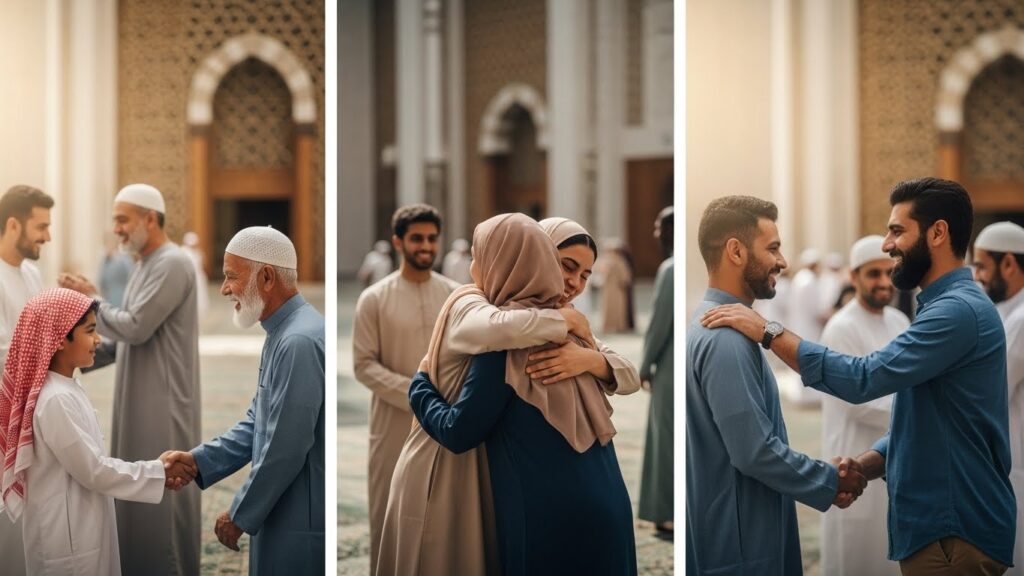Learn the Islamic way of greeting with Quran and Hadith. Discover its meaning, importance, and etiquette in Islam to spread peace and unity.
Introduction
The Islamic way of greeting is a noble tradition that goes beyond simple words. It carries a message of peace, mercy and brotherhood. When Muslims say As-Salamu Alaikum and respond withWa Alaikum Assalam, they exchange sincere prayers of safety and blessings. This greeting is not only a form of respect but also a reminder that believers are connected through faith.
Greetings hold great importance in Islam because they strengthen love, remove distance, and bring hearts closer. The Prophet Muhammad ﷺ said: “You will not enter Paradise until you believe, and you will not believe until you love one another. Shall I not tell you about something which, if you do it, you will love one another? Spread the greeting of peace among yourselves.” (Sahih Muslim)
The Quran also encourages spreading peace through greetings, while the Sunnah explains the right manners of offering and replying to them. By practicing the Islamic way of greeting in daily life, Muslims revive a Sunnah, strengthen their relationships and reflect the mercy and beauty of Islam.

What is the Islamic Way of Greeting?
The Islamic way of greeting begins with the words As-Salamu Alaikum, which mean“peace be upon you.” This phrase is more than a casual hello. It is a prayer, a reminder of faith, and a way of spreading peace among Muslims. The reply Wa Alaikum Assalam means “and peace be upon you too,” completing the exchange of blessings.
Unlike ordinary greetings, the Islamic way of greeting carries spiritual value. Each time a Muslim greets another, Allah rewards them for following the Sunnah of the Prophet Muhammad ﷺ. The act of greeting reflects kindness, respect and the desire to live in harmony with others.
In everyday life, this greeting helps believers start conversations with sincerity and warmth. It sets the tone for mutual respect and creates an atmosphere of brotherhood. When practiced sincerely the Islamic greeting becomes a powerful way to strengthen relationships and spread mercy in society.
Importance of the Islamic Way of Greeting in Islam
The Islamic way of greeting holds a special place in the teachings of Islam. It is not only a polite exchange but also a sign of faith and obedience to Allah. By saying As-Salamu Alaikum, a Muslim spreads peace and shows respect, while the reply Wa Alaikum Assalam completes the cycle of kindness and unity.
The importance of the Islamic way of greeting lies in its ability to strengthen bonds between people. It creates love, removes hatred and brings hearts closer together. A simple greeting can turn strangers into friends and soften hard feelings between families or communities.
The Quran commands believers to greet one another with peace reminding them that greetings are a source of blessing. The Prophet Muhammad ﷺ also said: “Spread peace between yourselves, and you will love one another.” This shows that greetings are not just good manners but a direct way to increase love and faith.
When Muslims practice this Sunnah daily, they earn reward from Allah and revive a tradition that builds stronger societies. The Islamic way of greeting encourages kindness in every meeting, whether at home in the mosque, or in public. It is a small act with a great impact on both individuals and communities.
Etiquette of the Islamic Way of Greeting
The etiquette of the Islamic way of greeting teaches Muslims how to exchange greetings with respect and humility. Saying As-Salamu Alaikum is not only about words but also about manners and sincerity. Islam provides clear guidance on who should greet first how to respond and the spirit behind the greeting.
The Prophet Muhammad ﷺ explained the order of greeting to maintain respect and harmony. He said: “The rider should greet the walker, the walker should greet the one who is sitting, and the smaller group should greet the larger group.” (Sahih Bukhari). This Hadith shows that greetings are linked to humility, with those in a position of advantage showing kindness first.
Responding to a greeting is also part of etiquette. Allah commands in the Quran: “When you are greeted with a greeting, respond with one better than it or return it equally.” (Surah An-Nisa 4:86). This means that if someone says As-Salamu Alaikum, the best reply is Wa Alaikum Assalam wa Rahmatullahi wa Barakatuh, adding extra prayers of mercy and blessings.
Muslims are also advised to greet everyone, not only friends or close ones. A true greeting spreads peace to both the known and the unknown. At the same time, Muslims should avoid changing the words of the greeting or replacing it with cultural terms that lack the same spiritual meaning.
Islamic Way of Greeting vs. Cultural Greetings
The Islamic way of greeting stands apart from cultural greetings like “hi,” “hello,” or “good morning.” While these phrases are common in daily life, they do not carry the same depth or spiritual meaning. The words As-Salamu Alaikum are a prayer of peace, mercy, and safety. In contrast, cultural greetings are simple expressions of politeness without religious value.
The difference becomes clear when we look at the rewards.The Prophet Muhammad ﷺ said that spreading peace through greetings strengthens love and faith. Saying As-Salamu Alaikum is not only good manners but also an act of worship that earns reward from Allah. On the other hand, cultural greetings may show respect, but they do not bring the same spiritual benefits.
Another difference is the sense of unity. The Islamic way of greeting connects Muslims across languages, nations and cultures. No matter where a Muslim travels, hearing As-Salamu Alaikum creates an instant bond of brotherhood. Cultural greetings often change depending on country or custom, but the Islamic greeting stays the same everywhere.
This does not mean Muslims cannot use polite words like“hello” in casual settings. However, the preferred greeting remains As-Salamu Alaikum because it follows the Sunnah spreads peace and reflects Islamic values. Choosing this greeting keeps alive a tradition that brings blessings and strengthens the Muslim community.
Greeting Non-Muslims in Islam
Islam teaches fairness and respect in all interactions, including greetings. When it comes to greeting non-Muslims scholars have offered different views. Some scholars say Muslims should begin with As-Salamu Alaikum only when addressing fellow Muslims while others allow a general greeting of peace to anyone.
A Hadith in Sahih Muslim mentions: “Do not initiate the greeting of peace to the Jews and Christians…”. Based on this narration many scholars hold the opinion that the Islamic greeting should be reserved for Muslims. However, if a non-Muslim says As-Salamu Alaikum first, Muslims are instructed to reply with Wa Alaikum (and upon you).
At the same time Islam also encourages kindness and good manners. Some scholars explain that offering a polite and respectful greeting in the local language is allowed when interacting with non-Muslims, as long as it does not replace the Islamic greeting among Muslims. This shows that Islam balances maintaining faith with showing respect to others.
Quranic Guidance on the Islamic Way of Greeting
The Quran gives clear guidance on the Islamic way of greeting, showing how important it is in the life of a believer. Greeting with peace is not just a custom but a command from Allah, who encourages Muslims to begin their interactions with words of mercy and kindness.
One powerful verse says: “When you are greeted with a greeting, respond with one better than it or return it equally. Surely Allah takes account of all things.” (Surah An-Nisa 4:86). This verse highlights that responding to greetings is an obligation, and answering with an even better greeting brings extra reward.
Another verse mentions the practice of spreading peace: “But when you enter houses, greet one another with a greeting from Allah, blessed and good. Thus does Allah make clear to you the signs so that you may understand.” (Surah An-Nur 24:61). Here, Allah links greetings to blessings, making it clear that they bring goodness to both the one who greets and the one who responds.
Through these verses, the Qur’an makes it clear that greetings are a part of Islamic etiquette and a reflection of faith. The Islamic way of greeting is therefore more than words; it is an act of obedience, a form of worship and a means of spreading peace in society.

Hadiths About the Islamic Way of Greeting
The Hadiths give clear guidance on the Islamic way of greeting and explain its role in daily life. Prophet Muhammad ﷺ taught Muslims to spread peace through greetings and showed by his actions how important it is. The Islamic greeting is not only a habit but also a Sunnah that brings reward and strengthens faith.
One Hadith in Sahih Muslim says: “You will not enter Paradise until you believe, and you will not believe until you love one another. Shall I tell you something that if you do, you will love one another? Spread the greeting of peace among yourselves.” This shows that greeting with peace is directly connected to love, faith, and entry into Paradise.
Another Hadith recorded in Sahih Bukhari mentions: “The rider should greet the walker, the walker should greet the one who is sitting, and the smaller group should greet the larger group.” This Hadith explains the etiquette of who should start the greeting, teaching Muslims humility and respect.
These Hadiths highlight that the Islamic way of greeting is more than a polite gesture. It is a means of spreading love, building unity, and showing obedience to Allah. By practicing these teachings, Muslims can turn every meeting into an opportunity for reward and goodness.
Conclusion
The Islamic way of greeting is more than a cultural habit. It is a Sunnah that spreads peace, strengthens faith and brings hearts closer together. Each time a Muslim says As-Salamu Alaikum and hearsWa Alaikum Assalam, they exchange prayers of mercy and safety while earning reward from Allah.
The Quran and Hadith show that greetings are a part of worship and a path to love and unity. By following the etiquette of greeting and avoiding common mistakes, Muslims can keep alive a tradition that reflects the beauty of Islam.
In today’s busy world a simple greeting can change someone’s mood, soften relationships and remind us of our shared faith. Practicing the Islamic way of greeting daily is a small act with a great impact, bringing peace to homes, communities and society as a whole.
So let us revive this Sunnah, spread greetings with sincerity, and keep the message of peace alive in every meeting.
“The Islamic way of greeting is a timeless Sunnah that spreads peace, strengthens bonds, and keeps the light of brotherhood alive in every heart.”
